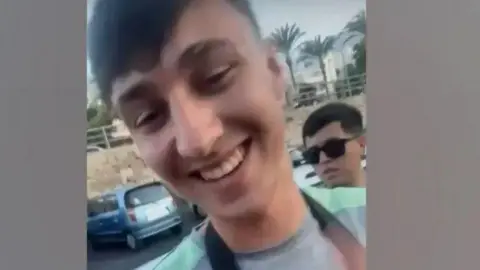 Handout
HandoutAs the inquest into Jay Slater’s death concluded, key details of his last hours were given.
The 19-year-old, from Oswaldtwistle in Lancashire, went missing in Tenerife in June 2024 after attending a music festival.
His body was found in a remote national park in a steep and inaccessible area by a mountain rescue team at the end of a 29-day search.
The inquest at Preston Coroner’s Court began in May, but was adjourned after a plea from Mr Slater’s mother that key witnesses who were with him on the night he disappeared should be made to attend.
While some witnesses came forward, the court was not able to contact Brandon Hodgson and Stephen Roccas, who were with Mr Slater before he went missing.
After hearing all the evidence, coroner Dr James Adeley ruled that “Jay Dean Slater died an accidental death” without third-party influence, after a fall in a “particularly dangerous area” that resulted in skull fractures and brain trauma that killed him instantly.
‘Our hearts are broken’
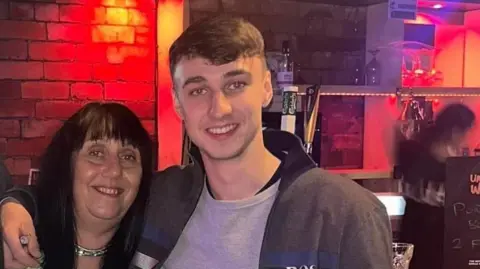
Mr Slater was an apprentice bricklayer on his first holiday with his friends, flying to Tenerife to attend the NRG music festival in Playa de las Americas on 16 June 2024.
Speaking at his inquest, mum Debbie Duncan said he was “a bundle of fun with a constant smile”, adding he “always made new friends wherever he went”.
She said: “He had a large circle of good friends who have been left devastated at his tragic death.
“He was very loved and our hearts are broken. Our lives will never be the same without Jay.”
On the night itself, Mr Slater’s friends went home, but they said he appeared to want to continue to party after taking drugs and alcohol.
He got into a car with two men he had met on the holiday and was driven to an Airbnb in the remote village of Masca, about 22 miles (36km) away from where he was staying.
His friend Bradley Geoghegan told the inquest he felt the Mr Slater “probably got there and thought, ‘Why am I here?’ sobered up and decided to come back.”
Mr Geoghegan said he had told him to get a taxi back, but he decided to walk back – even though it was a 14-hour journey and he had been offered a lift the following afternoon.
Despite his friends searching the area, there was no sign of Mr Slater, and he didn’t return to his accommodation.
He was reported missing to Spanish police on 18 June.
Local police and mountain rescue teams began searching and his mother and brother boarded a flight to Tenerife.
‘Mark on him’
Mr Geoghegan told the two-day inquest that he last saw his friend at about 02:40 BST on 17 June 2024.
Mr Slater had sent him a text message claiming he had been refused entry to Papagayo nightclub and claimed it was because “they had a mark on him”.
Mr Geoghegan confirmed during the hearing that the refusal of entry to the nightclub was because Mr Slater “couldn’t stand up”.
He added that he walked outside to meet his friend and that in “the fresh air he could now stand and wasn’t so bad”.
He also confirmed Mr Slater had taken ecstasy and cocaine and may have taken ketamine too.
Missing data
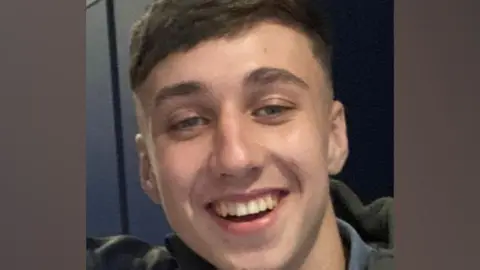
Lancashire Police Det Ch Insp Rachel Higson, a specialist in the Digital Department, told the inquest about her analysis of the teenager’s phone.
An iPhone 14 was found on the body, and it was confirmed to be Mr Slater’s by the telephone and email address on it.
It was confirmed during the inquest that before an examination of the phone could take place, some information and messages were lost due to “blocking of various people on various social media sites”.
The coroner added this was “not a criticism or any form of censure but simply an explanation that some of the data was not available to interpret”.
Det Ch Insp Higson said various messages on the phone confirmed that Mr Slater had separated from his friends at some point during the early hours of the morning.
Lucy Law
Lucy Law, who had known Mr Slater for about six years, was the last person to speak to him on the phone.
She told the inquest at about 02:00 BST on the day of his disappearance, Mr Slater left her and her friends, who had been together on the dancefloor of a club.
They then tried to find him.
When she eventually saw him she told him they had been worried about him, but “he just found the situation funny”.
She said a friend had later called her to say he was in the mountains and did not have much phone battery after he had left an AirBnB.
She said she thought it was a joke until her friend said it was more serious.
“I thought they were having me on,” she said.
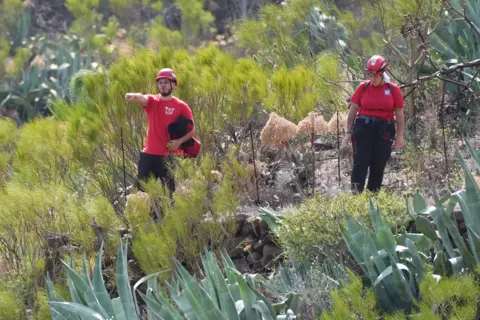 PA Media
PA MediaIn a subsequent phone call with Mr Slater – the last known outgoing communication from his phone – she asked him where he was and what he was doing.
He told her he had missed a bus and decided to walk the 14-hour journey home but was lost, needed water and his phone had only 1% of its battery life left.
He told her he was “in the middle of the mountains” and there was “literally nothing” around.
“By this stage, I’m panicking,” she told the inquest, adding she had urged him to go back to where he came from.
The last phone call lasted just 22 seconds and cut off suddenly. The hearing heard it is possible that at such low battery levels the phone terminated the call.
When he didn’t return, she set up a fundraising page and urged the police to start a search.
Body found
Spanish police had had an approximate location for the search, the Rural de Teno park, because Mr Slater’s phone had pinged off a mast.
The search large scale search involved helicopters, drones, rescue teams and dogs, with crews working through difficult terrain and having to hack through thick vegetation with machetes.
With steep ravines and cliffs across the landscape, the Spanish authorities deployed helicopter crews, specially trained search dogs and drones.
Mr Slater’s friends and family also searched.
On 15 July, the teams searched the treacherous Juan Lopez Ravine – a little-used area with no water – and found Mr Slater’s body.
Around 66ft (20m) above where the body was found, Mr Slater’s bag, with his phone and gas canisters inside, was discovered.
The Spanish authorities said they could not explain why Mr Slater “took a chance” by leaving the road to descend down the ravine.
But the sea could be seen from the head of the ravine, and they suggested he may have believed he could reach a beach and get help.
Their report said: “It would be easy to slip on the rocks and fall into the void.”
Through fingerprint testing, the body was confirmed by the police and Canary Islands Higher Court of Justice to be Mr Slater.
His injuries were consistent with a fall on to rocky ground from height.
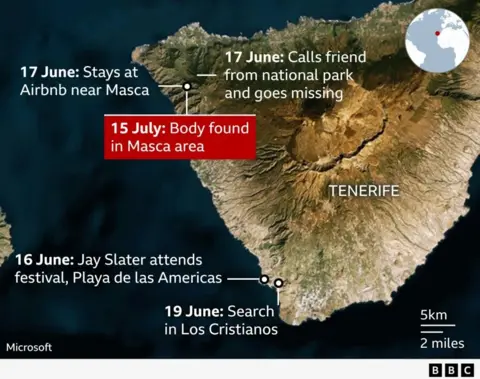
Lack of suitable clothing
Coroner Dr James Adeley said contributing factors to the fall might have been a lack of suitable clothing, lack of sleep and lack of mountain training, as well as potential after-effects from drugs Mr Slater had taken.
The impact of the skull was enough to cause non-survivable brain injuries, even if he received immediate medical help and death was likely instant, he said.
There were fractures on his pelvis in multiple places.
The coroner said he hoped it was of “some consolation to the family” that Mr Slater would not have been in pain.
Before concluding the inquest, the coroner said there was “every indication Jay’s friends were concerned about him”, adding they “made efforts to find him and persuade him to return”.
“In particular Lucy Law made repeated attempts to find Jay on the evening and look after his welfare,
“As Jay is an adult, he has every right to ignore such concerns and to make his own decisions,” he added.




